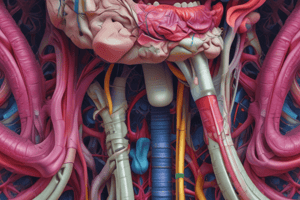Podcast
Questions and Answers
What is the main function of the piriform fossae in relation to the larynx?
What is the main function of the piriform fossae in relation to the larynx?
- Anchoring the vocal cords
- Protection against food entering the larynx (correct)
- Respiration
- Phonation
Which of the following sections of the larynx contains the vocal cords?
Which of the following sections of the larynx contains the vocal cords?
- Glottis (correct)
- Supraglottis
- Epiglottis
- Infraglottis
Which cartilage is not part of the laryngeal skeleton?
Which cartilage is not part of the laryngeal skeleton?
- Hyoid bone (correct)
- Cricoid cartilage
- Thyroid cartilage
- Epiglottis
What is the role of the quadrangular membrane in the larynx?
What is the role of the quadrangular membrane in the larynx?
How many paired cartilages are part of the laryngeal skeleton?
How many paired cartilages are part of the laryngeal skeleton?
What type of epithelium predominantly lines the larynx?
What type of epithelium predominantly lines the larynx?
Which nerve supplies the larynx?
Which nerve supplies the larynx?
Which group of laryngeal muscles primarily act on the vocal cords?
Which group of laryngeal muscles primarily act on the vocal cords?
What happens in terms of sensory innervation if there is damage to the recurrent laryngeal nerve?
What happens in terms of sensory innervation if there is damage to the recurrent laryngeal nerve?
Which muscle is responsible for adducting the vocal cords?
Which muscle is responsible for adducting the vocal cords?
What structures form the true vocal cord?
What structures form the true vocal cord?
Flashcards are hidden until you start studying
Study Notes
Location and Function of the Larynx
- The larynx, or voice box, is located in the anterior neck at the level of the C3-6 vertebral bodies.
- It connects the oropharynx to the trachea and has several functions.
Structure of the Larynx
- The larynx is divided into three sections: supraglottis, glottis, and infraglottis.
- The glottis is the narrow area at the level of the vocal cords and divides the supraglottis and infraglottis.
- The larynx has a framework of cartilages, membranes, and ligaments lined by respiratory mucosa.
- The laryngeal skeleton consists of 9 cartilages: 3 single and 3 paired.
- The 3 unpaired cartilages are: epiglottis, cricoid, and thyroid cartilages.
- The 3 paired cartilages are: arytenoid, corniculate, and cuneiform cartilages.
Cartilages and Membranes
- The cartilages are connected by numerous membranes and ligaments to unite the larynx as a single structure.
- Three membranes connect the unpaired cartilages of the larynx to each other and to other nearby structures.
- The quadrangular membrane spans between the epiglottis and arytenoid cartilages.
Laryngeal Muscles
- The larynx has two groups of muscles: extrinsic and intrinsic.
- Extrinsic muscles attach the larynx to other structures and act to move the entire larynx.
- Intrinsic muscles are found within the larynx itself and act primarily on the vocal cords.
- Extrinsic muscles include: sternothyreoideus, sternohyoideus, and thyrohyoideus.
- Intrinsic muscles include: lateral cricoarytenoid, transverse arytenoid, and cricothyroid.
Actions of the Larynx
- The larynx executes different movements depending on the action being performed.
- During swallowing, the larynx has several protective mechanisms to prevent food/drink from entering the airway.
Nerve Supply of the Larynx
- The larynx is innervated by branches of the vagus nerve (CN X).
- The branches are the superior laryngeal nerve and the recurrent laryngeal nerve.
- The recurrent laryngeal nerve has an important path, branching distally from the vagus nerve and then travelling back on itself towards the larynx.
- The supraglottis is supplied by the internal branch of the superior laryngeal nerve, while the infraglottis is supplied by the recurrent laryngeal nerve.
- The innervation of the glottis is somewhat disputed, but many accept that it is innervated by the recurrent laryngeal nerve.
Studying That Suits You
Use AI to generate personalized quizzes and flashcards to suit your learning preferences.





